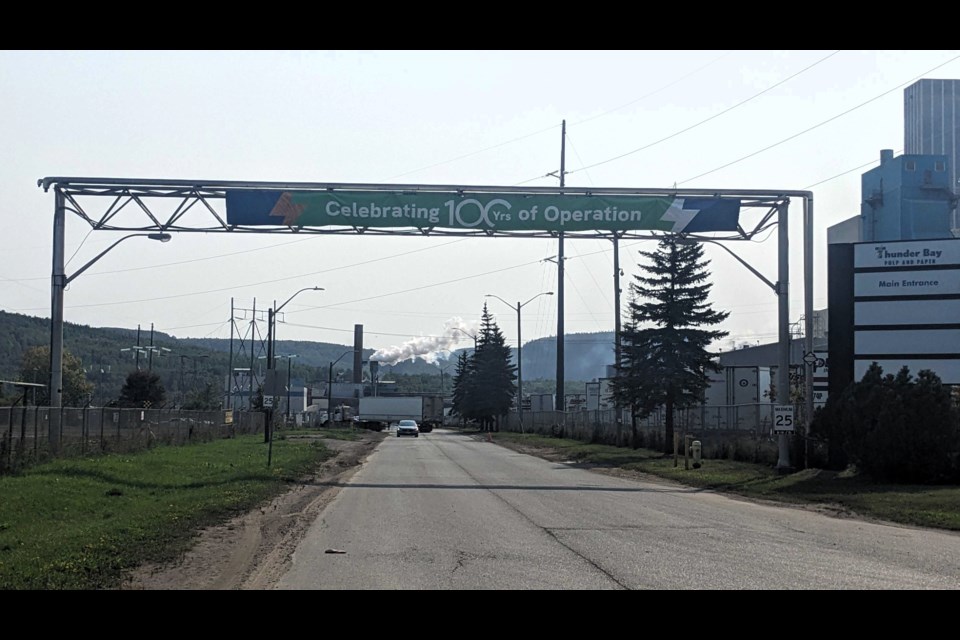THUNDER BAY – Thunder Bay Pulp and Paper has changed names many times over the last 100 years, but the innovation, reliance, and stability of the mill remain the same.
“I think it speaks to the sustainability of the forest products industry. It's not like a mine where it runs out and you shut it down. It's a sustainability to take a product and change direction. Then make different other products and invest,” said Thunder Bay Pulp and Paper Mills president Kent Ramsay at an event celebrating the milestone anniversary of the plant, which has carried the Resolute and Bowater names in the most recent period of its lengthy history.
“And it shows that the history and the decision-making of the founders of this mill were pretty astute. Because if you think about it all that time from ground wood pallets to different types of paper through all the trials, tribulations and different parts of it, the investments in that you don't see a 100-year-old facility. You see a lot of investment and a lot of money and that economic activity is what's created a lot of the base of Thunder Bay and provided for a lot of families over that generation.”
Ramsay outlined the innovative changes throughout the years. Recognized as one of the largest pulp and paper mills in the world, Thunder Bay’s mill still generating acres of product year after year, expanding into new markets, despite new technology advances threatening to collapse the industry.
“The invention of the internet draining the paper base has resulted in its own downsizing. I think you see that contraction has stopped. And over the last number of years, we've been able to start to grow the business back again,” Ramsay explained.
“I think you're going to see a bit of a renaissance as we start to look at bioproducts and biofuels and other products that come. Frankly paper isn't going away. The new generation likes a book and that's a good thing. Everybody buy a book and read a book because you get to put the phone away and it gets to give you a break from that.”
He foretells the next 100 years of innovation at the mill will profoundly be in the sustainability of bioproducts. The mill has transitioned into the green economy by manufacturing more bioplastics and biofuels, which he admits not too many think about.
"We make tall oil which has turned into a biodiesel. That's already happening. We make turpentine, but that turpentine is made into fragrances and flavours. It's made into all sorts of products that people don't realize," Ramsay said.
“But they use it every day when they go shopping. You buy a lemon meringue pie at one of the grocery stores and by and large, the flavour of lemon comes from turpentine molecule that comes from the forest and comes from a tree.”
The ceremony held at the mill welcomed multiple generations of employees, stakeholders, and dignitaries.
Fort William First Nation Chief Michelle Solomon offered her congratulations for being able to attend the celebration while also sharing some of the more complicated history between the First Nation and the mill over the last 100 years.
“I was looking at the book that was shared and all that has happened over 100 years and it would not be right for me to come here and not acknowledge that there's a whole other side to this story across the river,” said Solomon.
She noted how the relationship between both parties has changed. Even though she acknowledged there is room for improvement, a path is working together as neighbours.
“I really want to acknowledge your celebration here today and all the people who have worked here over all these years. The hard work. There are people here that have retired from here and spent a lifetime working here and how that has contributed to their families, their Children, their grandchildren and to the community and economy of the City of Thunder,” she reflected.
Newly minted Associate Minister of Forestry and Forest Products Kevin Holland acknowledged the success story of the Thunder Bay Pulp and Paper Mill as an economic powerhouse in Thunder Bay and the region.
“Just a multitude of people that have contributed to and shared in the success of this organization. And, it's so exciting to see everybody gathered here. This is an example of what we can accomplish when we work together,” said Holland.
“The forest industry has deep roots in our history and Thunder Bay pulp and paper has been at the heart of it all contributing to the prosperity of the countless families, supporting local businesses and fuelling the progress for the entire region.”
